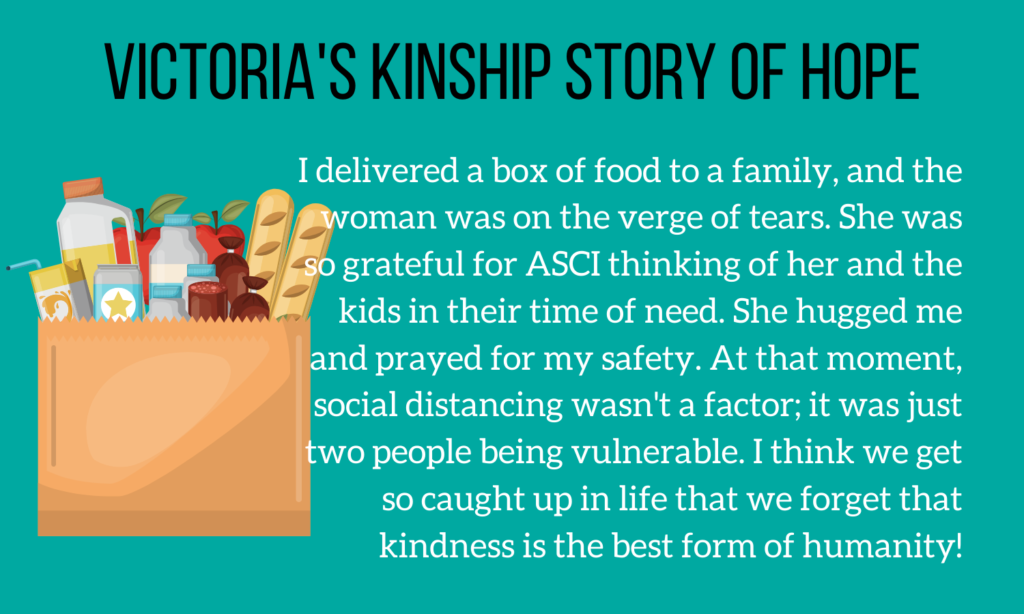Blog
Kinship Stories of Hope
April is the National Month of Hope, something of which we are all in need during this difficult and unprecedented time. As such, ASCI employees share how they are remaining positive and hopeful while the stay-at-home order is in effect, as well as special #KinshipStoriesofHope illuminating how our kinship families are doing the same.
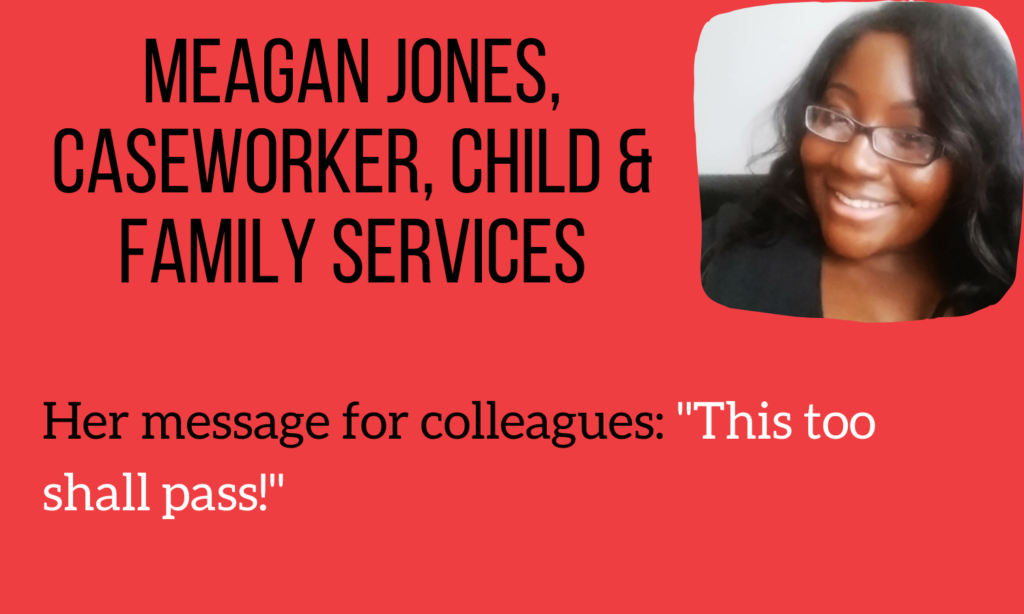
“I have learned to adapt to the new normal,” explains ASCI caseworker Meagan Jones. “It is different not seeing families in person, but adjusting is easy. I do miss seeing my families and interacting with them.”
To help balance work life with home life under the same roof, Jones stays focused and manages stress by making to-do lists, practicing self-care and enjoying tea to relax. “Not to sound cliché, but I manage stress by drinking a hot cup of tea. I would say I am tea fanatic. I also go sit outside on the deck and take in some fresh air. Having this regrouping strategy has helped a lot.”
Jones credits her family for helping her get through this tough time. “My family has helped me by staying prayerful,” she says. “We know this pandemic is not easy, but we continue to remain positive and know things are going to get better in due time.”
When things return to normal, Jones looks forward to being able to socialize with her friends and loved ones, and to go to restaurants and the library.
Upon returning to the office, Jones explains, “I look forward to seeing all the smiling faces of my colleagues.”
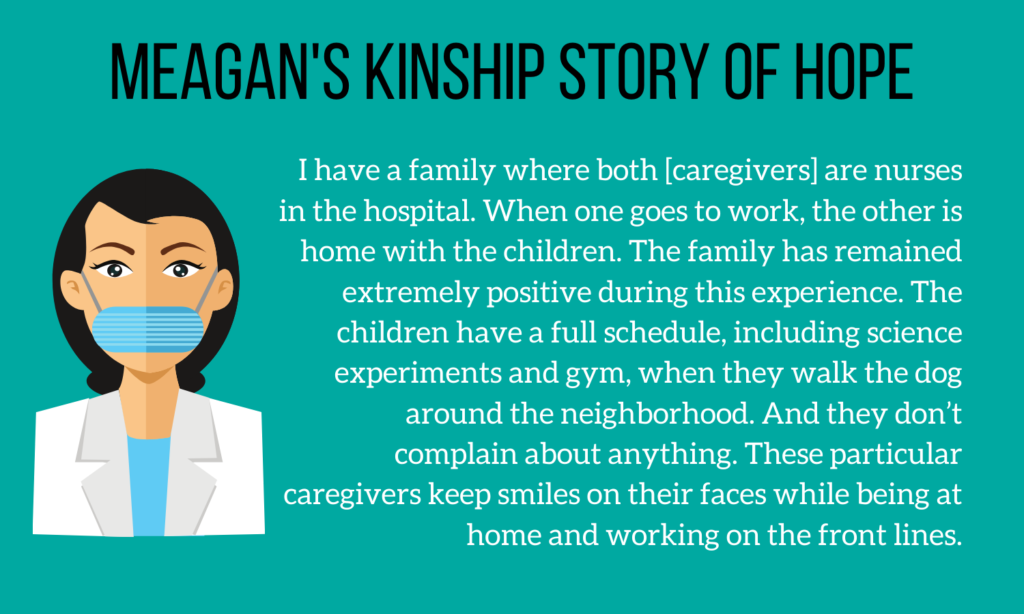
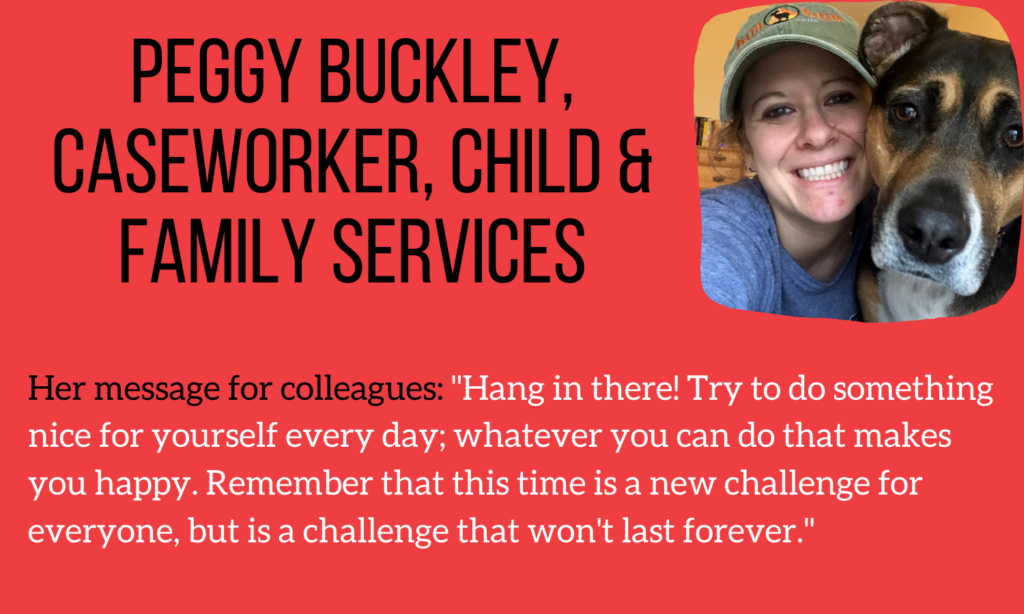
ASCI caseworker Peggy Buckley finds that remaining goal-oriented and creative during this time is helping her stay positive. “I’ve been trying to reframe the social isolation experience as an opportunity to spend more time with my dog and as a chance to complete some cleaning and organizing projects that I’ve been avoiding, using ‘I’m too busy’ as an excuse,” she explains. “My goal is to come out on the other side of the pandemic with a clean and rearranged house. As part of rearranging the house, I converted the office into a music room to encourage myself to spend more time playing the piano and using more creative outlets.”
While Buckley is accustomed to working in the field, staying organized and active has made it easier for her to stay focused and manage any stress that comes with working from home. “I’m lucky because I am still able to utilize my normal stress management technique: running and walking my dog,” she says. “I’ve been making sure that I wake up early enough in the morning to get in some exercise before I begin my workday. When I clock out at the end of the day, I typically take my dog for another walk. She is definitely ready for me to go back to a normal work schedule. Once I’m done working for the day, I put away my computer and files so that I can transition into whatever household chores need to occur.”
Virtual service delivery has been a learning experience for Buckley and her families, but she remains hopeful as they continue to work together and communicate often. “I’ve been coaching some families on how to use virtual platforms, varying from Google Duo to Zoom to Lifesize. Some of my caregivers had never used any form of video chat before and the children in their care are toddlers, so we have been working together to figure out the easiest method for them. Increased communication via text message and phone calls has assisted me in ensuring that all my families are receiving any services they need. During the video conferences, I’ve been playing games with the kids. One of my kids invented his own card game, which ended up working really well.”
Although she has had to reschedule a cross-country trip to see her family, Buckley is grateful for their love and support during this time. “Although everyone has been disappointed, my family was very supportive in helping me reschedule the trip for next year. My mom also sewed me some extra face masks so that she ‘didn’t have to worry as much,’” she says.
When the pandemic ends, Buckley is most looking forward to visiting her friends and seeing her fellow ASCI co-workers in the office.
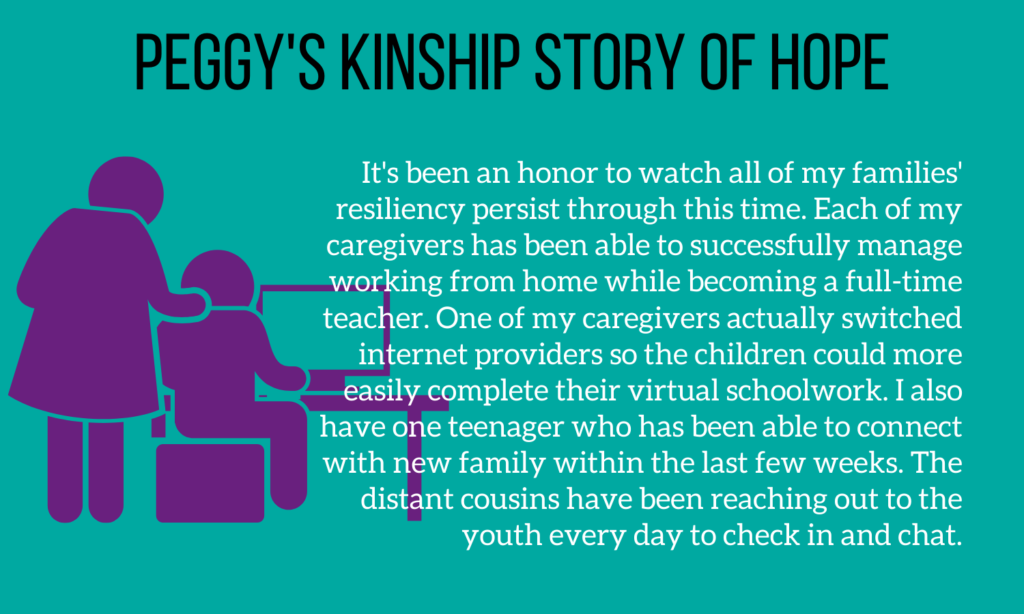
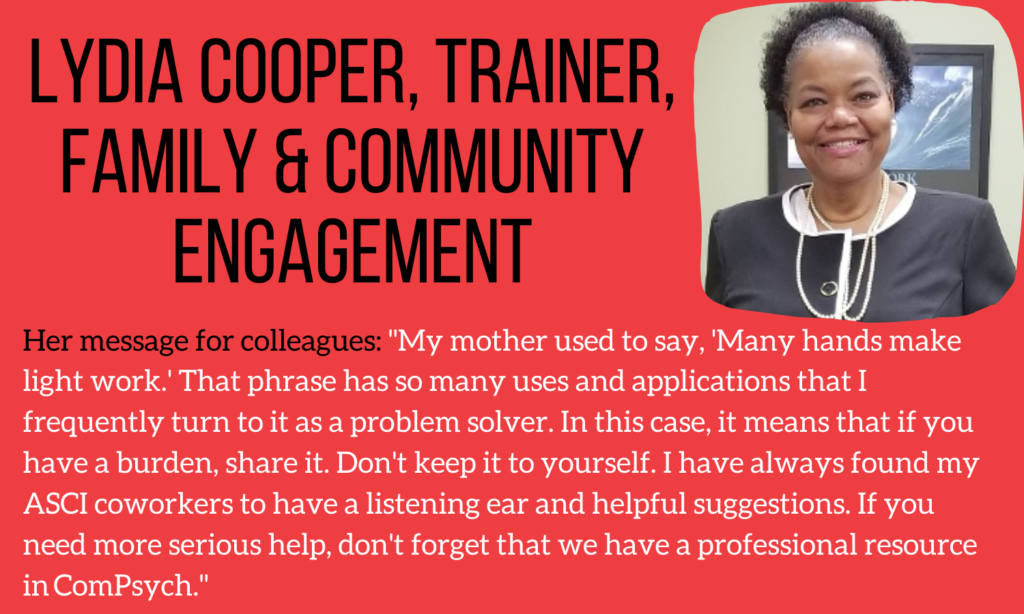
Lydia Cooper, trainer in ASCI’s Family and Community Engagement (FACE) department, has found communication to be essential in staying positive during this time. “I actually spend a lot of time talking to people,” she explains. “I’ve been training almost every single workday, and when I’m not training, I’m calling caregivers to schedule trainings and we spend a lot of time talking and comparing quarantine notes. Sharing funny stories is good for both of us.”
Despite the challenges that come with virtual service delivery, Cooper uses creative ways to make caregivers feel as engaged at home as they would in the office. “Instead of white boards and flip charts, I have poster boards and markers from Dollar Tree on the wall behind me,” she says. “Figuring out the logistics of turning part of my bedroom into a home studio was a lot of creative fun. Giving the caregivers the freedom to do things onscreen like feed babies, introduce their pets and show off their baked goods creates a powerful group atmosphere that counteracts the isolation of home computer learning.”
Cooper remains hopeful with the help of her family, as they make her laugh and provide her support at home while social distancing. “A sense of humor has always been one of my family’s greatest strengths,” she says. “They keep me laughing. Due to a heart condition, I’m confined to my bedroom in isolation from the rest of the household because some of them are still working outside the home. They are keeping the house clean, go to the store for me if I need anything and spray disinfectant on every handle, light switch and doorknob after they touch it.”
Cooper says she most looks forward to “the smiles and ‘good mornings’ when people see each other at the start of the day” upon returning to the ASCI office.
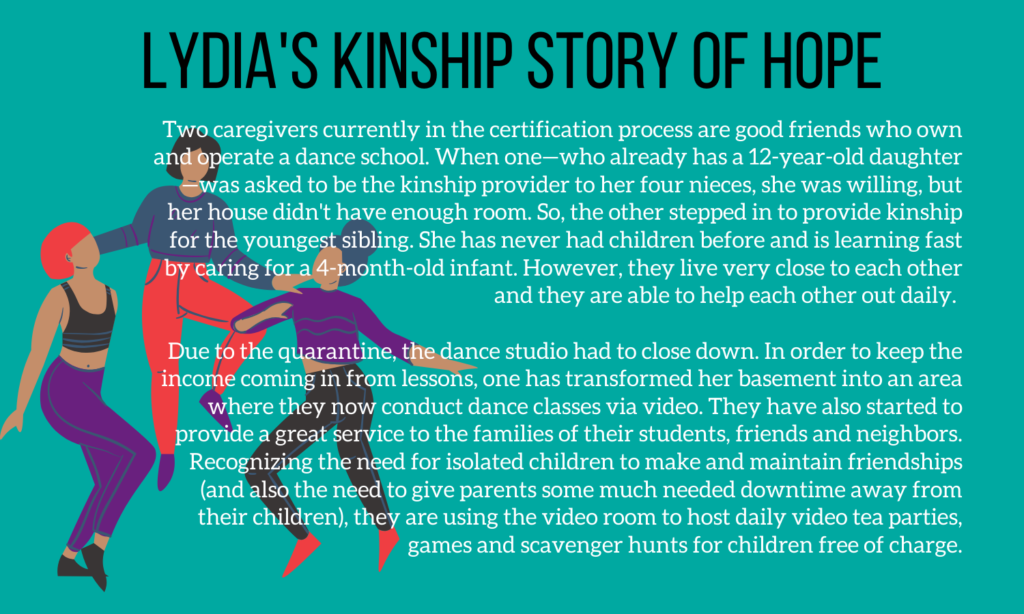
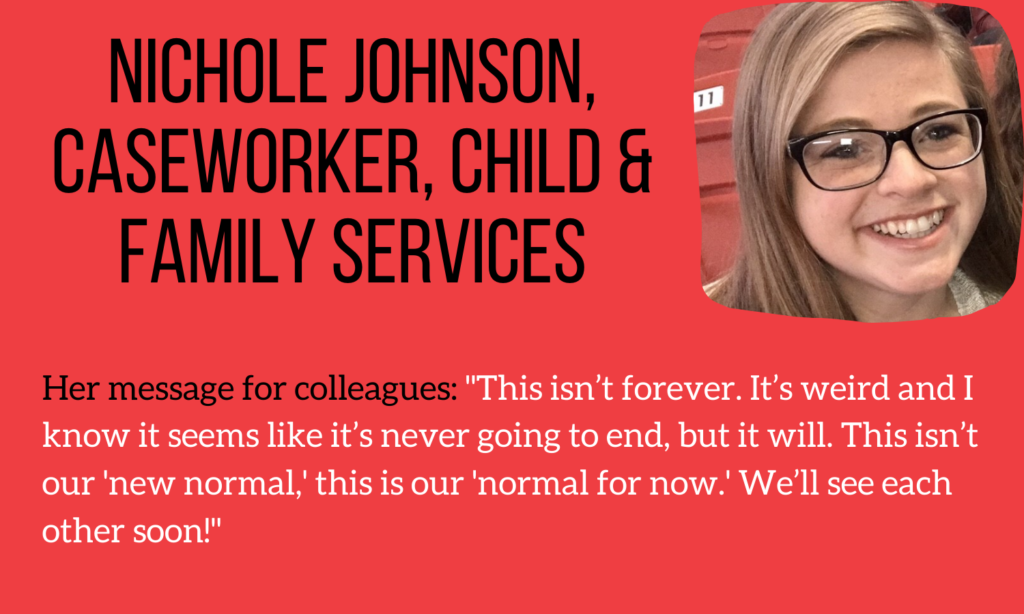
ASCI caseworker Nichole Johnson has remained positive amid COVID-19 by being creative through cooking, music and art. “I’m using my time at home to revisit old hobbies,” she explains. “I have been baking a lot (I’ve mastered homemade waffles, and I’m trying my mom’s chocolate chip cookie recipe this weekend) and playing music again! I’m playing guitar for the first time in years. I’m also taking advantage of the outdoors; I’m taking my dog on long, leisurely walks around the neighborhood, taking a different route every day.”
Johnson has even incorporated some of this creativity into her daily work schedule as a way to remain focused. “Every day, the first thing I do is make my to-do list using markers. I choose a color theme (pastels, greens and blues, pinks and purples, etc.) and make my list. I’ve found that being able to cross things off my list keeps me on task. Also, knowing when to take a break. Sometimes you just need to take a lap around the house or stand up and stretch to reset,” she says.
Despite the challenges that come with virtual service delivery, Johnson explains how teamwork with her families has been encouraging. “My families and I are working through it together,” she explains. “It’s been the hardest for toddlers on my caseload; they don’t understand why I can’t be there in person, and they just want to play together, which isn’t easy virtually. I’ve found doing story time with them has been a great way to keep them engaged. I’m grateful for everyone’s patience as we navigate virtual visits together.”
While she is managing stress by finding ways to separate work and home, Johnson is most looking forward to being able to spend time with her friends and family when the stay-at-home order lifts, as well as returning to her normal work environment with her fellow caseworkers. “I miss being able to ask people questions or bounce ideas off them” she says. “I miss feeling the caseworker suite buzz with energy. I miss the constant noise that comes with an office. I’m excited to experience that again soon.”
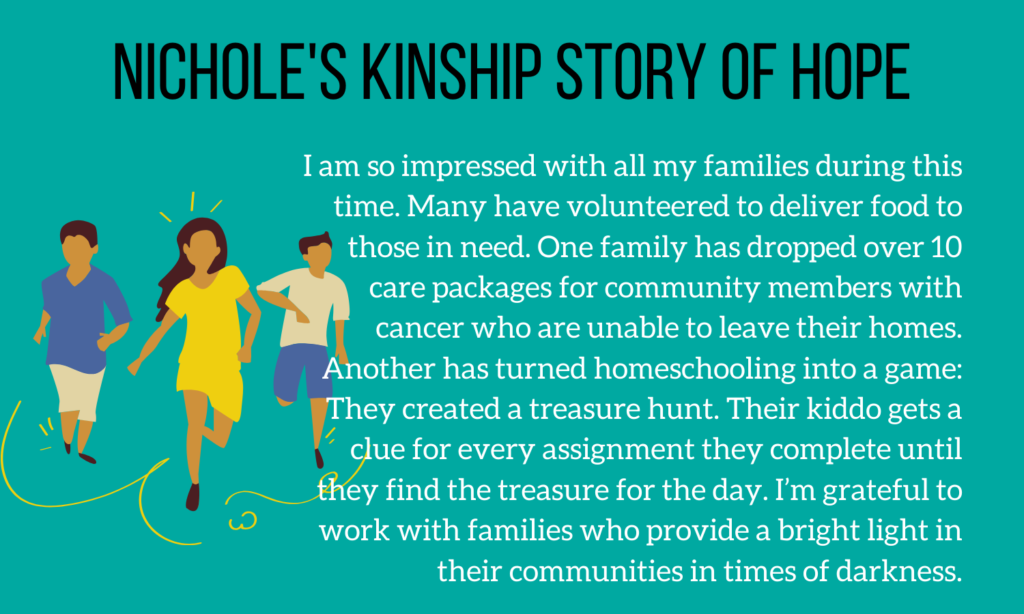
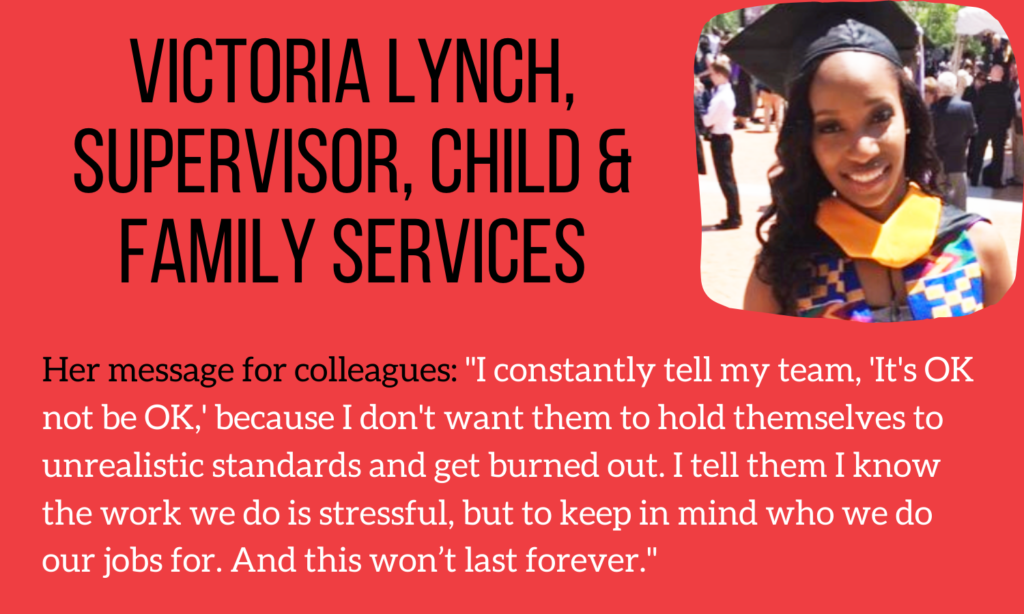
For ASCI casework supervisor Victoria Lynch, staying organized has been essential to remain focused while working from home during this time. “Things like to-do lists and reminders in my Outlook calendar are my best friends” she says. “I do find myself taking smaller breaks from home than I would from the office, but it keeps me from becoming overwhelmed.”
Not only does staying organized help with working from home, but Lynch also uses different methods of stress management to cope with balancing the two. “During this extended period in my home, I’ve found myself exercising and reading more than I have ever before,” she says. “It is important for me to shut down at the end of the workday and disconnect from ASCI in order to promote a healthy work-life balance. When I become stressed about a work-related task, I call my director for her insight and hear how she would complete the task at hand.”
While there have been a number of changes made to accommodate social distancing, for Lynch, virtual service delivery has proven to be successful with the help and support of ASCI’s Family and Community Engagement (FACE) department. She explains, “Because technology is not a foreign subject, the realm of virtual service delivery was not hard to get accustomed to. The FACE department provided staff with two virtual visit trainings for added support.”
Communicating with friends and family, as well as positive self-talk, has helped Lynch remain positive during this difficult time of isolation. “Another way I keep myself from getting down is to remember I’m not alone and things could be worse. I think COVID-19 has humbled me in ways I didn’t anticipate.”
When the pandemic breaks, Lynch is eager to return to the ASCI office, go out to socialize and travel with her daughter. “My daughter and I love to travel. So, we constantly talk about the vacations we will take once the pandemic is over. Thinking ahead to something positive is beneficial to us,” she says.
